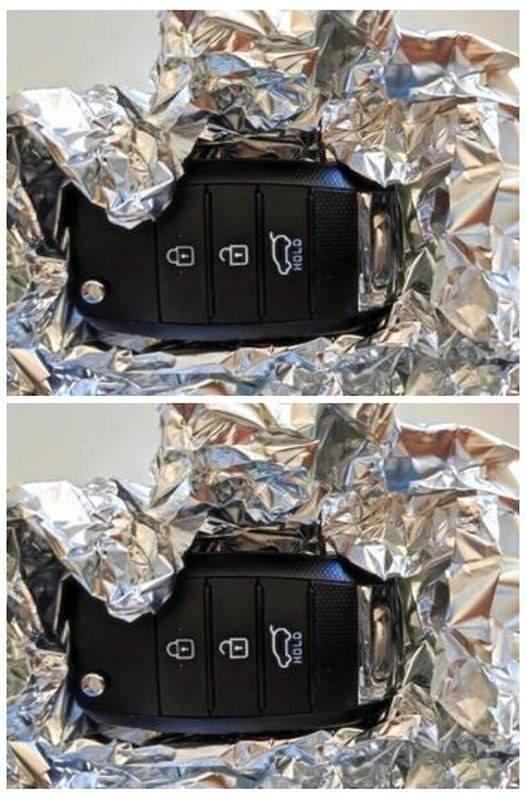ADVERTISEMENT
How Aluminum Foil Prevents Relay Attacks
Aluminum foil can act as a simple, yet effective shield against relay attacks. By wrapping your car keys in aluminum foil, you’re essentially blocking the radio signals that the key fob emits. This technique is commonly referred to as a Faraday cage, named after the scientist Michael Faraday, who discovered that certain materials can block electromagnetic fields.
A Faraday cage works by creating a barrier that prevents signals from passing through it. In the case of your car key fob, the aluminum foil blocks the radio frequency signals, making it impossible for thieves to capture and amplify the signal. This keeps your car secure, even if someone is lurking nearby with a relay device.
The Simple Solution: Wrapping Your Car Key in Aluminum Foil
Wrapping your car keys in aluminum foil may seem like an odd, old-fashioned solution, but it’s highly effective at preventing unauthorized access to your vehicle. Here’s how you can do it:
- Take a Small Piece of Aluminum Foil: Simply grab a piece of aluminum foil large enough to wrap around your key fob.
- Wrap the Key Fob Tightly: Carefully wrap the foil around the key fob, ensuring that it’s completely covered on all sides. Make sure there are no gaps or holes in the foil for signals to escape through.
- Store the Wrapped Key in a Safe Place: Once your key is wrapped, you can safely store it in your bag, pocket, or drawer without worrying about hackers stealing your car’s signal.
For those who may find wrapping keys every time a hassle, there are also RFID-blocking pouches or Faraday bags available in the market. These pouches are specifically designed to block signals and work just as well as aluminum foil but may be more convenient and stylish to carry.
Other Ways to Prevent Relay Attacks
While wrapping your keys in aluminum foil is a great first step in protecting your car from relay attacks, there are also other precautionary measures you can take:
- Keep Your Car Keys in a Metal Box or Safe: Storing your keys in a metal container (such as a metal drawer, box, or cabinet) will have the same effect as wrapping them in foil and can be a more organized solution.
- Use a Key Fob Cover: Some key fob covers are made from material that blocks RFID signals, providing an extra layer of protection while you carry your keys around.
- Turn Off Key Fob Signals: Some modern key fobs allow you to disable the signal when not in use. Check your car’s manual to see if this is an option for you.
- Park in a Secure Location: Always park your car in a well-lit, monitored area, such as a garage or parking lot with surveillance. It’s a simple way to reduce the chances of theft.
Is Aluminum Foil the Only Solution?
While aluminum foil is an effective and low-cost solution for blocking signals from your key fob, it’s not the only option. RFID-blocking wallets and bags are becoming increasingly popular for people who are worried about the security of their keyless entry systems, and they provide more convenience and functionality.
However, for those who want a quick, budget-friendly fix, aluminum foil remains one of the easiest ways to prevent a relay attack and ensure your car is as secure as possible.
Conclusion: A Simple Yet Effective Hack
Putting your car keys in aluminum foil may seem like a quirky old trick, but it’s one that could save you from a potential car theft. By wrapping your key fob in aluminum foil, you’re creating an effective Faraday cage that blocks the signals from your key fob, making it impossible for thieves to perform a relay attack. It’s a simple, inexpensive solution that adds an extra layer of security to your vehicle.
So, the next time you’re wondering why someone would put their car keys in aluminum foil, remember: It’s not just for leftovers—it’s a clever way to keep your car safe and secure from modern-day thieves.
ADVERTISEMENT
